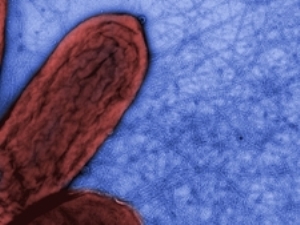University of Massachusetts, Amherst researchers recognize a basic, previously unidentified microbial nanowire property in a bacterium called Geobacter sulfurreducens that enables long-distance transportation of electrons.
The microbial nanowires are networks of filaments found in bacteria that can efficiently move charges similar to organic, synthetic metallic nanostructures and this is possible over considerably long distances several thousand times the length of the bacteria stated the research team. The study was headed by Derek Lovley, a microbiologist in collaboration with physicists Nikhil Malvankar and Mark Tuominen and their colleagues.
 Microbial nanowire property in a bacterium
Microbial nanowire property in a bacterium
Biofilms are cohesive aggregates of numerous cells and comprise intricate networks of microbial nanowires, rendering conductivity to this biological material that can be compared to the one found in polymers used in the electronics sector. Researchers reported that this is the first time they observed electrical charges with metal-like conductivity across a protein bio-film. Previously, it was assumed that this level of conduction occurs with the help of proteins called as cytochromes. However, UMass Amherst team identified long-term conduction that occurred without cytochromes. The filaments of Geobacter act like perfect wires and make the electrons to get transferred onto iron oxides, a natural mineral found in soil.
Lovley and his colleagues made use of the fact that Geobacter can grow on electrodes in the lab, replacing iron oxides. The bacteria produce biofilms, which are thick and electrically conductive, on the electrodes. In further studies, using strains that were genetically modified the researchers discovered that the biofilm’s metal-like conductivity is due to the nanowires’ network that spreads all over the biofilm. These structures can be tuned in a way that was not done previously.
The natural approach of Geobacter is innovative as it allows manipulation of conducting properties by just controlling gene expression or altering the temperature to produce a new strain. Malvankar stated that a biofilm can behave like a biological transistor by the introduction of a third electrode. Another benefit Geobacter has, is its capability to create eco-friendly and cost-effective natural materials.
Source: http://www.umass.edu/newsoffice/